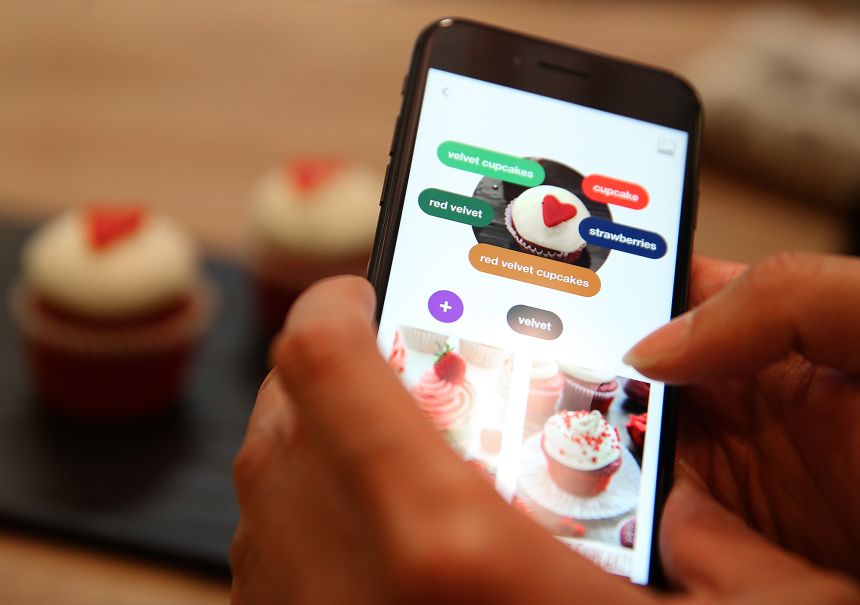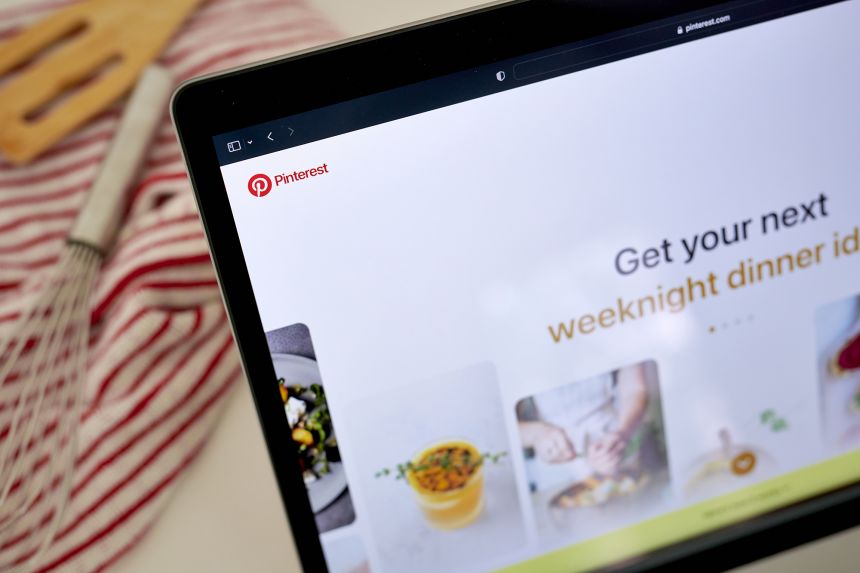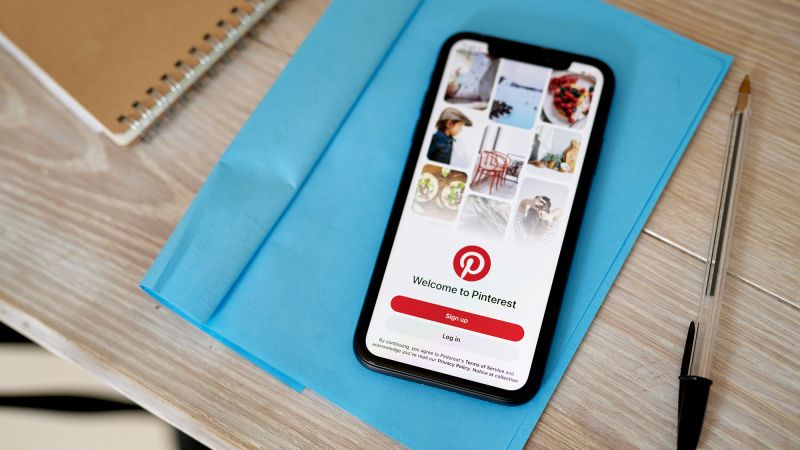New York
—
Abigail Wendling, 23, uses Pinterest to curate everything in her life, from recipes to wallpapers. At least until she saw a one-eyed cat when searching for a wallpaper. In another instance, a search for healthy recipes turned up a puzzling image showing a slice of cooked chicken with seasonings sprinkled inside it.
These posts were created by generative AI, which is quickly overtaking the photo-first platform. Pinterest, like other social media platforms, has grappled with a flood of AI slop since the launch of ChatGPT’s Sora video generation tool in 2024. The company has taken proactive steps to curb the content for users who don’t want it.
But the presence of generative AI has struck a chord with Pinterest’s creative community, with users telling CNN that they feel unheard as the company’s C-Suite goes all in on the burgeoning technology.
“It makes me want to put my phone down and do something else,” said Wendling, who also uses Instagram and TikTok. “I would say Pinterest has the most AI-generated photos and videos out of every social media app I’m using right now … I have to look over everything with a microscope now.”
Diving headfirst into AI has been a priority for Pinterest CEO Bill Ready, who took over the company in 2022. The former Venmo and Braintree leader has rebranded Pinterest “from a platform of window shopping” to “an AI-powered visual-first shopping assistant” in its latest earnings call this month. And it’s not alone: Pinterest joins Google, OpenAI and Amazon in a push to revamp the online shopping experience with AI.

Pinterest logged 600 million global monthly active users, half of which are Gen Z and many of whom use it for shopping inspiration. Its third-quarter revenue recently grew 17% year-over-year to $1 billion.
Artificial intelligence, a technology that Silicon Valley is racing to adapt and monetize, is at “the heart of the Pinterest experience,” he said.
What that means for Pinterest users is the stress of trying to navigate AI slop, more advertisements and less content they want to see on the platform, users told CNN.
“I want to see art that a human being has put time and effort into, not some gorge spit out by someone who typed a few words into an image generator,” Amber Thurman, a 41-year-old Pinterest user from Illinois, said to CNN.
Over the past year, Pinterest has responded to user complaints. It rolled out a “tuner” last month to adjust how much AI content users want to see and was an early adoptor in labeling Gen AI images on its platform earlier this year.
“While many people enjoy GenAI content on Pinterest, we know some want to see less of it,” a Pinterest spokesperson said in an email to CNN, adding: “Pinterest prioritizes high-quality content and what is inspirational to our users – whether it’s AI-generated or not.”
However, Pinterest users who spoke to CNN said they no longer recognize the app they signed up for and argue that the platform hasn’t kept up with the daily flood of AI content. The tools to limit AI, they argue, aren’t enough.
“There’s not a precise ability for any platform to catch 100% of what is AI-generated,” Ready said in the earnings call.
Pinterest once served as a haven from fast-talking commentary on TikTok, life updates from former classmates on Instagram and relatives arguing over politics on Facebook.
Founder Ben Silbermann told CNN in 2019 that the platform’s primary goal was to inspire users. Users curated mood boards and pinned cookie recipes. Creatives and artists flocked to the app to find real-life design inspiration.

But in 2025, tech giants are racing to capitalize on a technology that some have called as impactful as the smartphone or the internet itself. And that includes finding new ways to monetize. AI.Meta, for example, will soon start using user conversations with its AI assistant to inform targeted ads.
For Pinterest, its future hinges on AI-powered shopping. Its algorithm pinpoints products for users based on their searches in the app.
In its latest quarter, the number of people clicking on advertiser links grew by 40% compared to the year before and has increased by more than five times in the last three years, according to earnings reports. The company is doubling down on that momentum by introducing more AI features, such as a shopping assistant users can converse with that acts as “a best friend,” the company said.
However, some long-time users are not buying Pinterest as a shopping ad.
Hailey Cole, a 31-year-old creative director from California, began using Pinterest’s competitor Cosmos for design inspiration recently. She said she’s never purchased anything from the platform and is worried that Pinterest’s AI content may be stealing intellectual property, as she said it happened to her. Pinterest’s policy states it will take down accounts of those who repeatedly infringe on copyright or intellectual property.
“I’ve heard the CEO say (Pinterest is a shopping app); I don’t know where he came up with that… I think that’s him more just envisioning or manifesting,” Cole said.
Wendling said she worries about authenticity on Pinterest. With the sheer amount of fake content on the platform, even if she sees something she likes, she said she would go to another site and buy it.
Users will have to “live with both” slop and new technology as companies work to monetize the technology, Jose Marichal, a professor of political science at California Lutheran University, told CNN.
Pinterest’s leaders certainly are.
Over time, AI will follow a similar trajectory to Photoshop, Ready said. “Almost every piece of content you see will have been at a minimum edited by AI in some form or another.”
But that approach could jeopardize the authentic feel that drives users to the platform in the first place.

AI-generated posts often lead to off-platform websites that profit off affiliate marketing, Casey Fiesler, associate professor of information science at the University of Colorado Boulder, told CNN.
For example, one of the first search results for “chocolate chip cookie recipe” on Pinterest led to a photo of the dessert. The post linked to a different site that was riddled with ads and had an AI-generated image of a chef. The recipe itself matched almost exactly to a ChatGPT query asking for “the best chocolate chip cookie recipe ever.”
On an algorithm-driven social media site, the one thing that users can control is their own engagement with AI content. Even leaving a hate comment or sending it to a friend as a joke can signal to the algorithm that you want to see more of that content, Fiesler said.
Media literacy is also more important than ever as users will need to sniff out slop on their own.
“These platforms are looking to gain short-term metrics, but they are degrading user experience and long-term trust,” said Tony Sampson, senior academic at the University of Essex.
So far, the users that spoke to CNN have been cutting down on their Pinterest usage. While some are moving to new apps like Cosmos, others are finding themselves back on older sites like Tumblr.
“For something like Pinterest in particular, I imagine it makes people a little sad,” Fiesler said. “They used to see a lot of human-created content that they found inspiring, and now it’s just a lot of very non-human, perhaps not inspiring content.”

